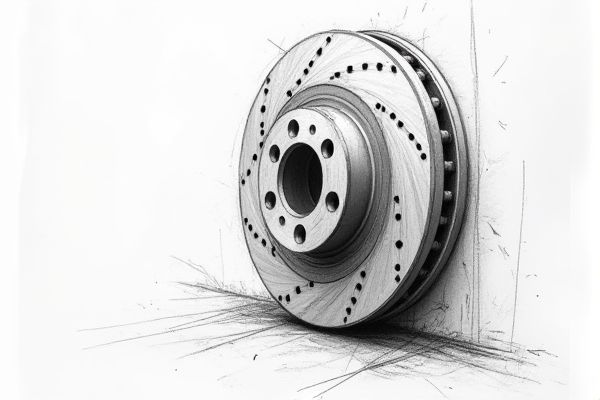In today's fast-paced world, choosing the right car brand can be a daunting task given the multitude of options available. From luxury vehicles that offer unmatched comfort and innovative technology, to budget-friendly models known for their reliability and efficiency, the market caters to a diverse array of preferences. With industry giants continuing to push the boundaries of performance and sustainability, discerning drivers are often left pondering which name stands out among the rest. Below, we explore some of the most reputable brands that are currently setting the benchmark in the automotive world.

Illustration of cars
Best brands of cars in 2025
Toyota
Toyota is the largest automobile manufacturer globally, having achieved a cumulative global production of 300 million cars as of September 2023, with the Corolla series being the highest produced model at 53.399 million units. Toyota holds 10.7% of the global market share, surpassing competitors like Volkswagen and Honda. The company produces approximately 10 million vehicles per year and has been the world's first automaker to produce over 10 million vehicles annually since 2012. Toyota's success is also reflected in its strong sales in the U.S., with over 2.2 million vehicles sold in 2023. The company's models, such as the Camry, RAV4, and Corolla, are highly popular, dominating sales in several states. For more detailed information, visit the Toyota Newsroom.
Honda
Honda is one of the leading automobile producers globally, with notable performance in various markets. In the 2024 fiscal year, Honda sold approximately 4.1 million automobiles worldwide, although this was 11.4% lower than the previous year. Despite this, Honda's U.S. sales saw a significant increase, with a 45% rise in the first quarter of the 2024 fiscal year, and the brand's market share increased to 7.4% from 6.1% in the previous year. Honda's production also showed resilience, with a year-over-year increase in July 2024, marking the first YOY increase in three months for worldwide production. The brand's incentives and average transaction prices also saw notable changes, with incentives rising by 67% to an average of $1,393 per vehicle. For more details, visit the Honda Newsroom.
BMW
BMW has solidified its position as a leading producer in the global premium car segment, delivering a record 2,553,341 vehicles in 2023, a 6.5% increase from the previous year. In 2023, BMW saw a significant growth of 7.3% in its brand sales, with 2,253,835 vehicles delivered worldwide. The brand's fully-electric vehicles experienced a remarkable surge, with 330,596 units sold, representing a 92.2% increase. In the first quarter of 2024, BMW sales in the U.S. rose by 1.2%, with 84,475 BMW-branded vehicles sold, and electric vehicle sales in the U.S. increased by 63% to 10,713 units. BMW continues to drive innovation, particularly in electromobility, with all-electric cars making up nearly 15% of total sales. For in-depth BMW statistics, visit their webpage.
Mercedes-Benz
Mercedes-Benz is a leading luxury car brand, known for its premium quality and innovative technologies. In 2023, it captured 2.2% of the U.S. light vehicle market and achieved a customer satisfaction index score of 83, 4% higher than the previous year. The brand reported strong second-quarter results in 2024, with an adjusted EBIT of EUR 4.0 billion and a Return on Sales (RoS) of 10.2% for Mercedes-Benz Cars. Mercedes-Benz also saw significant growth in electric vehicle sales, with a 248% increase in 2023 compared to 2022. The company is ranked fourth in the global automotive brand value, with a market cap of USD 85 billion. For more detailed insights into their financial performance, visit their interim report for Q2 2024.
Audi
Audi is one of the leading car manufacturers, known for its robust production and innovative offerings. From 2019 to 2023, Audi's production volume fluctuated between 1.79 and 1.94 million cars, with a notable increase of 13 percent in 2023 to reach 1.94 million units. The brand saw significant growth in electric vehicle deliveries, with a 51 percent increase in 2023, resulting in over 178,000 fully electric vehicles delivered. In the first half of 2023, Audi's deliveries in Europe and the USA saw substantial growth, with a 24 percent increase in Europe and a nearly 30 percent increase in the USA. This strong performance underscores Audi's commitment to electromobility and its robust market presence. For more detailed information, visit their press release.
Ford
Ford Motor Company stands as a leading automaker, having assembled over 1.8 million vehicles in the U.S. in 2023, solidifying its position as the No. 1 American automaker for the sixth consecutive year. With a global market share averaging 5.3% between 2020 and 2022, Ford maintains a significant presence worldwide, although its market share has declined in several regions, such as North America from 14% to 12.5% by 2022, and in China from 4.7% to 1.8% by 2023. Despite this, Ford employs about 57,000 hourly manufacturing workers in the U.S. and continues to innovate with vehicles like the Bronco and Ranger. In 2023, Ford held a market share of 12.4% in the United States and 14.4% in Canada. The company's commitment to American innovation and ingenuity remains strong. For further insights, explore their achievement as America's top automaker in 2023.
Tesla
Tesla remains a leading producer of electric vehicles, having produced 469,696 vehicles in the third quarter of 2024 and delivering 462,890 vehicles during the same period, marking a 6% increase from the previous year. As of 2024, Tesla's market share in the EV sector has been around 52%, although it has declined from nearly 80% in 2019 due to increasing competition. Despite this, Tesla maintains a significant lead with over 6.7 million electric vehicles sold to date. In 2023, Tesla achieved a record production of 1,845,985 vehicles, and its annual production has increased 3.75 times from 2019 to 2022. Tesla's global market share among BEVs (Battery Electric Vehicles) stood at 17% in the first five months of 2024. For more detailed statistics and insights, visit Tesla sales statistics.
Lexus
Lexus has solidified its position as a leading luxury car brand, achieving a global record high of 824,258 unit sales in 2023, a 32% increase from the previous year. This growth was driven by strong demand in North America, Europe, and Japan, along with a significant increase in electrified vehicle sales, which reached 47% of total sales. In 2023, Lexus saw notable regional growth, including a 129% increase in Japan and a 46% increase in Europe. The brand's commitment to electrification is evident, with plans to offer electrified versions of all its models by 2025. Lexus's market share in the U.S. luxury vehicle segment stands at 16.9%, positioning it as a major competitor in the industry. For more detailed insights, you can check out their global sales results for 2023.
Subaru
Subaru is renowned as one of the top car producers, known for its commitment to safety, dependability, and driving performance. In 2024, Subaru earned the top ranking in the American Customer Satisfaction Index Survey with an ACSI score of 83, highlighting its success in categories such as vehicle safety, dependability, and driving performance. The company also produces a significant portion of its vehicles in the U.S., with 48.7% of its vehicles made at Subaru of Indiana Automotive being sold in the U.S. market. Subaru's All-Around Safety philosophy has contributed to its lower fatal accident rate, with a goal to achieve zero fatal accidents by 2030 through advanced technologies like AI. Additionally, Subaru reported a 9.5% increase in April 2024 sales, with the Forester remaining its top seller.
Volkswagen
Volkswagen is one of the leading car producers globally, having produced 8,716,606 vehicles in 2022, marking a 5.2% increase from the previous year. The company operates 121 production plants worldwide and employs approximately 307,000 people. In 2023, Volkswagen achieved a significant revenue of EUR 322.3 billion (USD 353.5 billion) and held a 6% global market share. The company has seen a 35% increase in battery electric vehicle deliveries, reaching 771,000 units in 2023. Volkswagen's market share in Europe reached a record 27.6% in October 2024, driven by strong sales of electric vehicles like the Skoda Enyaq and Volkswagen ID.4. For a deeper insight into their impressive business development and production metrics, explore their comprehensive annual report.
















Leave a Reply
Your email address will not be published.